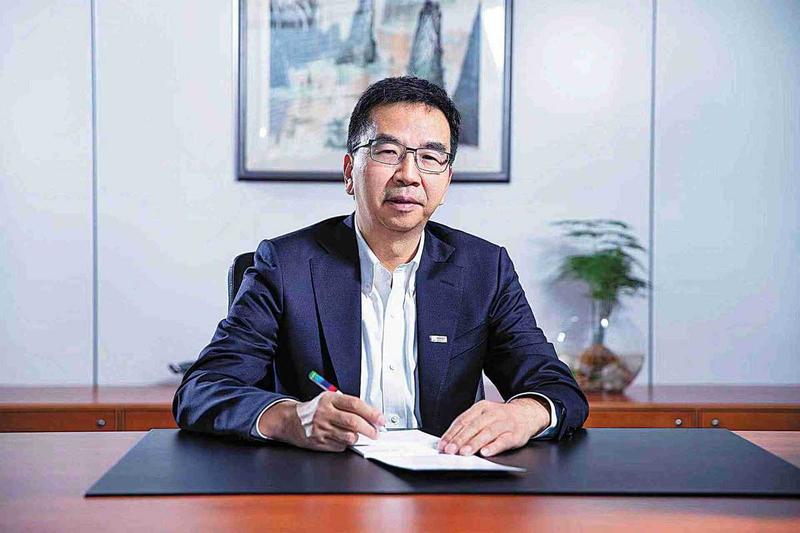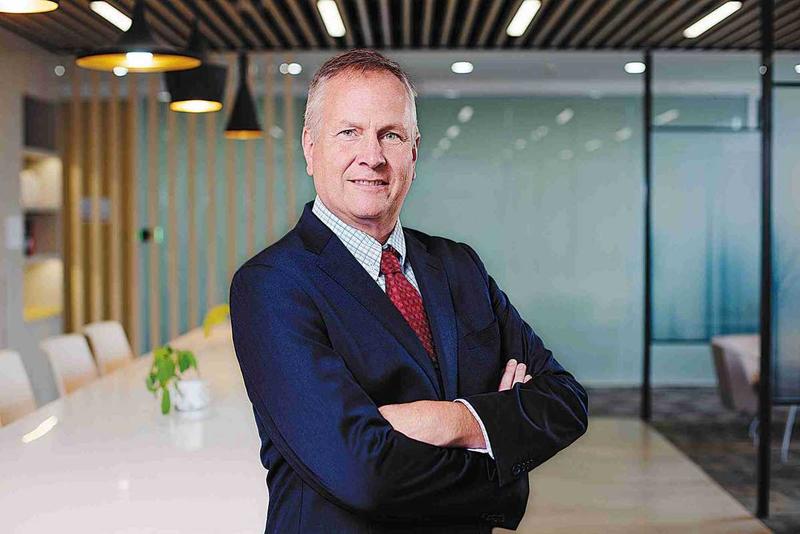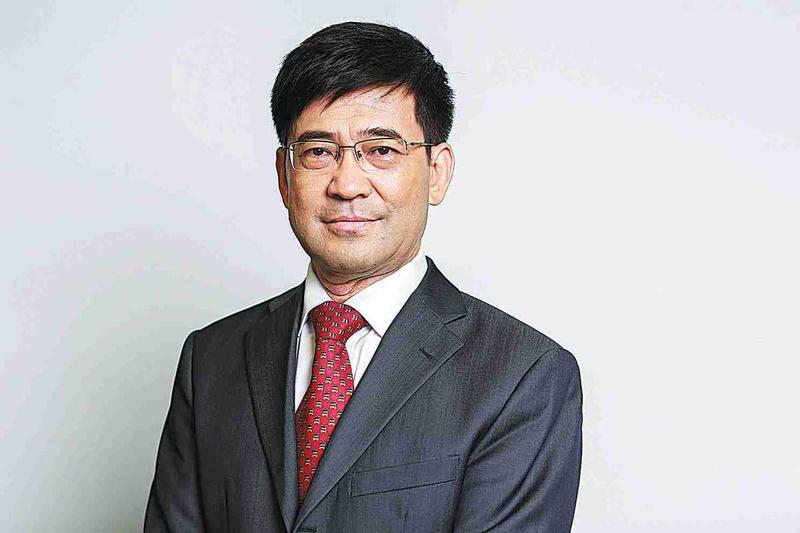Editor's Note: The Chinese economy has managed to withstand a slew of challenges in the past year, and policy priority in 2022 will focus on maintaining stable growth as identified by top policymakers at the annual tone-setting Central Economic Work Conference in December. China Daily talked to multinational executives on how they view the prospects for the Chinese economy and how they will align their business strategies with China's efforts to deepen reforms and push for high-quality development.
Q1: The year 2021 has seen the global economy withstand a variety of challenges in the form of COVID woes, trade disruptions, energy shortages, a roller coaster in commodities, high shipping costs and geopolitical tensions. Against such a background, what is your assessment of China's economic growth prospects in 2022 and beyond?
Q2: Within the macro context discussed earlier, how do you see your company's performance in China and future prospects relative to your global operations?
Q3: How do you view recent key meetings in China that have reinforced the country's sustained commitment to reform, opening-up, equal treatment for foreign businesses, and more measures to attract MNCs and foreign investors? What else should China do in this direction, especially in terms of surmounting potential barriers?
Q4: What is your view on China's net zero efforts (carbon goals), especially from the standpoint of potential new business opportunities they may spawn?
Q5: The question-"Is China still investable?"-has popped up in popular media discourse after the recent big-ticket regulatory changes (like antitrust/anti-monopoly measures and steps to preempt a possible debt bubble in property). How would you answer that question? Does China remain attractive for your business?
 Chen Yudong, president of Bosch China. (PHOTO PROVIDED TO CHINA DAILY)
Chen Yudong, president of Bosch China. (PHOTO PROVIDED TO CHINA DAILY)
A1 In 2021, along with the new normal of COVID-19 prevention and control, we have seen active and effective countermeasures taken by local governments at all levels in China. At the Central Economic Work Conference in early December, authorities proposed various policies to achieve growth targets and emphasized "stability at the forefront", giving us confidence in the long-term, stable and positive development of the Chinese economy.
A2 Due to COVID-19 disruption, 2021 was difficult for Bosch China. Yet thanks to strong recovery and development of the China market, especially in automotive, manufacturing and home appliance industries, together with the joint efforts of all employees, Bosch China achieved record high sales revenue. With this result, we still see China a major growth driver for the Bosch Group in 2021.
In the field of electrification, led by"3060" carbon goals, we view China as one of the most promising new energy markets in the world in terms of growth potential.
A3 Since the introduction of the new "Foreign Investment Law" in 2020, foreign investors can also enjoy equal treatment with domestic counterparts. This year, we are pleased to see the reduction of the negative list for the fifth consecutive year, as well as more emerging industries in the encouraged directory, including the further liberalization of foreign shareholding in passenger car companies, which brings more investment opportunities in the automotive industry.
At the same time, we also expect the business environment to be further improved, including strengthening intellectual property protection and regulating unhealthy expansion of capital.
A4 As we can see, compared with developed countries, the mission for China is more challenging, in terms of the amount of emission reductions and the short time frame left for the country. As a manufacturing company, Bosch would like to start as a role model and call on the industry to start with its own carbon footprint analysis, and gradually reduce carbon emissions following a targeted plan.
A5 We see that the Chinese market is still a huge market that continues to develop steadily. The 14th Five-Year Plan (2021-25) proposes to continuously expand the middle-income group, which means that both the current and incremental markets for consumer goods that are closely related to people's living standards hold great potential.
Bosch expects that long-term policy guidance will bring stable expectations and confidence to foreign investment. For Bosch, China has always been one of the most important markets.
 Liu Zhifei, vice-president of Corning Incorporated and president of Corning China. (PHOTO PROVIDED TO CHINA DAILY)
Liu Zhifei, vice-president of Corning Incorporated and president of Corning China. (PHOTO PROVIDED TO CHINA DAILY)
A1 Despite all challenges that many companies continued to grapple with in this time of pandemic, China is expected to grow its GDP by 8 percent in 2021 thanks to many public policies put in place by Chinese authorities. We believe that China will carry this momentum into 2022 and beyond by providing a favorable and stable overall investment environment for foreign investors.
A2 Corning has been in the China market for over 40 years. China is the only geographic market where we have a business presence for all of our five market access platforms outside the US. Throughout the last four decades, we have invested over $9 billion in 23 manufacturing and research facilities, hiring over 6,000 employees in China. Those investments have demonstrated our long-term commitment to the China market in supporting and growing together with our customers.
A3 Corning has closely witnessed China's rapid development in the last four decades. Our success in China could not be possible without the great support we have received from all levels of the Chinese government.
We believe China will continue to open up for foreign investments and provide a more favorable environment for businesses to thrive in the post-COVID era. With the detailed policies and regulations coming out of this process, we could further contribute to China's markets by joining hands with local partners, customers and related government institutions.
A4 Corning is committed to operating in an environmentally responsible manner-including measures to reduce emissions, waste, and energy and water consumption-while complying with and striving to meet all applicable laws, regulations, and company standards. We will undertake a strategic review to reduce our contribution to climate change and better align our operations with the Paris Agreement. Globally, we aim to increase Corning's use of renewable energy by 400 percent by 2030 from a 2018 baseline. In China, we're also actively contributing to the global goal through various implementations in the region.
A5 Yes. We saw the positive impact China has made by releasing and enforcing related policies and regulations, aiming to provide a stable financial system and a level playing field for all market participants. Corning committed one of its largest investments in China in 2020, when the pandemic was at its worst. In 2021, we had three plants that achieved mass production, and two new expansion projects were announced. Investment continues to be one of the key strategic pillars to realize our long-term commitment to the China market.
 Steven Lien, president of Honeywell China and Aerospace Asia-Pacific. (PHOTO PROVIDED TO CHINA DAILY)
Steven Lien, president of Honeywell China and Aerospace Asia-Pacific. (PHOTO PROVIDED TO CHINA DAILY)
A1 We believe China has the conditions and capabilities to keep the economy running within a reasonable range this year despite headwinds. As stability is the key word in the economic plan that was laid out at the recently concluded Central Economic Work Conference, we expect prudent and effective macro policies, enhancing support for innovation in science and technology, and vitalizing development through further opening-up.
We are optimistic about China's economic growth and believe the importance of the Chinese market will further grow.
A2 Among all of the markets in which Honeywell operates and develops, our growth in China continues to be robust with a strong market position. China has developed into Honeywell's second largest single market and the company's largest growth market. China's opening-up efforts and its focus on sustainability and digitalization create a very favorable investment environment and business opportunities for Honeywell.
A3 China has mapped out the priorities for its economic policy in 2022 at the recently concluded annual Central Economic Work Conference, stressing stability and more focus on supporting growth. It is encouraging that the conference has stated that the nation will promote institutional opening-up, better implement national treatment for foreign enterprises, attract more multinational companies to invest, and promote the early implementation of major foreign investment projects.
A4 Honeywell is uniquely positioned to shape a more sustainable future in China together with local partners. In fact, about half of Honeywell's new product introduction research and development investment is directed toward products that improve environmental and social outcomes for customers.
A5 According to data released by the Ministry of Commerce, foreign direct investment into the Chinese mainland rose 15.9 percent year-on-year in the first 11 months of 2021. It has shown that China's improving business environment and market resilience have maintained the confidence of foreign companies to invest and develop in China.
In 2021, Honeywell continued to expand its investment in China. For example, Honeywell Building Technologies business group launched its new innovation center in Xixian New District of Xi'an. The center leverages Honeywell's innovative R&D capabilities to enable the digitalization in western China, and further fulfill Honeywell's commitment to long-term development in China.
 Allan Gabor, president of Merck China and managing director of Merck Electronics China. (PHOTO PROVIDED TO CHINA DAILY)
Allan Gabor, president of Merck China and managing director of Merck Electronics China. (PHOTO PROVIDED TO CHINA DAILY)
A1 In the face of such a global environment with complexities and uncertainties, China achieved economic growth well above its target in 2020 and 2021. This shows a prospective potential in 2022. We appreciate China's great efforts to achieve high-quality development, and firmly believe there will be emerging markets and growing opportunities nationwide grounded on all levels of endeavor, even though there are pressing challenges in the future.
A2 To accelerate the implementation process of our "In China, with China" strategy, we have made great achievements and reached important milestones this year. With the double-digit growth rates nationwide recently, China became our second-strongest growth driver and second-largest sales market worldwide. As a strategic market, China keeps contributing to our global performance, which enables us to raise our outlook for value chain investment and further localization approach in the long run.
A3 With the sustained commitment and more supportive measures, a favorable internal environment for foreign business has been shaped and more potential has been cultivated. Externally, on the other hand, international cooperation has been promoted, even during the pandemic. These strategies and measures help bolster market confidence and contribute to a positive dual circulation. To further leverage the national platform and seize new opportunities, a series of proactive policies and an innovative pattern of high-quality development are expected, which allow us to give full play to our advantages and nurture business potential based on the requirements of development nationwide.
A4 In the context of Green China, we need to ramp up joint efforts at all levels and seek pathways to encourage endeavors nationwide. For Merck, carbon neutrality is also a key focus and part of our group strategy. We plan to achieve our sustainable goal of water management, carbon neutralization and waste recycling by 2030, 2040 and 2050, respectively, and extend our footprint in electronics to empower digital transformation and greater integration with innovation in the new era.
A5 The short answer is yes. In fact, the policy changes will play a key part in sustainable development in the long term, fostering a high-quality business environment. Still, it's critical to give priority to the focus sector in line with the big picture, such as localization and decarbonization. We continue to believe China can offer superior growth and vital opportunities, and will expand investment in business and hiring. In our Electronics, for instance, as part of our Level Up program, we plan to invest over 3 billion euros ($3.39 billion) up to the end of 2025 and China is certainly in the plan.
 Gao Yan, member of executive committee of Thyssenkrupp AG and CEO of Thyssenkrupp China. (PHOTO PROVIDED TO CHINA DAILY)
Gao Yan, member of executive committee of Thyssenkrupp AG and CEO of Thyssenkrupp China. (PHOTO PROVIDED TO CHINA DAILY)
A1 2022 will not be an easier one, as many of the challenges and uncertainties remain. In the recently concluded Central Economic Work Conference, Chinese authorities have set the tone to achieve "economic stability" as one of the priorities. I am confident that with a mix of measures to implement, China's economy will be stable and maintain a healthy GDP growth.
Because of the large scale of the China market and enormous domestic demand, we expect the Chinese economy will continue to show great resilience and be the growth engine of global economic recovery in the coming years.
A2 In our past fiscal year 2021, we are satisfied overall with our achievements in China. We are glad to see our businesses in China have made great contribution to the group's overall performance, not only in sales, but also in terms of profit and cash flow.
Looking into 2022, there are difficulties ahead due to the pandemic, such as challenges for supply chains. However, I am still confident in our businesses in China. China's "dual carbon goals" bring great demand for green solutions, including new energy vehicles and wind power.
A3 The outbreak of the pandemic led to a discussion on globalization, and more attention has been placed on supply chain safety and data security. In this context, it's crucial that China has been promoting further opening-up in more fields with broader range and greater depth, which brings confidence for foreign companies to stay and further invest in China.
Over the years, China has been improving its business environment with key measures such as rolling out the Foreign Investment Law in 2020 and gradually shortening the foreign investment negative list. The improvements are visible.
A4 China's "dual carbon goals" are ambitious and challenging, showing its sense of responsibility for environmental protection. The goals will inject new impetus with numerous business opportunities, including more needs for technologies that support carbon emissions reduction and renewable energy production. Thyssenkrupp plays an active role in climate protection with its innovative products, technologies and services.
A5 I believe the China market will remain attractive for foreign investment, as long as it continuously improves its business environment, and multinational corporations can conduct successful business based on a healthy market mechanism.
According to a business confidence survey of European companies in China, three out of four respondents turned a profit in 2020, nearly 70 percent are optimistic about future growth, and over 90 percent of respondents will maintain or increase investment in China. This result shows strong confidence of European companies in China.
 Zhou Xiaolan, president of Bayer Group China. (PHOTO PROVIDED TO CHINA DAILY)
Zhou Xiaolan, president of Bayer Group China. (PHOTO PROVIDED TO CHINA DAILY)
A1 When it comes to 2022 and beyond, we foresee continued growth stability and resilience in China's economy under key priorities of the 14th Five-Year Plan (2021-25) which underscores a commitment to the "dual circulation" concept for economic development, driven by reform and innovation to promote stability and "high-quality development" in China.
A2 Despite challenges and uncertainties last year, our business saw a strong rebound from 2020 and reported encouraging results. As the largest market for Bayer Pharmaceuticals and the second largest for Bayer Consumer Health, China has become one of the most important pillars of Bayer's global business. We expect to carry this promising momentum into this year and beyond.
A3 Bayer supports China's determination to promote economic globalization and opening-up. Thanks to China's efforts to accelerate innovation and improve the business environment in recent years, Bayer has been able to bring in the latest innovative products and solutions to China faster. This includes Bayer Continuous Glucose Monitoring System (CGMs)-an all-new model for intelligent diabetes disease management which was introduced at the Boao Lecheng International Medical Tourism Pilot Zone in 2021.
A4 Contributing to sustainable development has always been a core element of Bayer's corporate strategy and of our core values. We promote inclusive growth and a responsible use of resources to help people and the planet thrive. Bayer is committed to stepping up our efforts in sustainability and helping to resolve major challenges of our times. Bayer launched in September our first Asia-Pacific Forward Farm in China, which plays an innovative and leading role in our sustainability efforts.
A5 The answer is an obvious YES. Our business in China is key to our current and future success. As the business environment continues to improve in China in terms of strengthened IP protections and the roll-out of encouraging laws and regulations, e.g. to accelerate the review and approval of new drugs, we will continue to increase our investment here as we lead and redefine innovation in life sciences.
For example, despite the challenges brought by the pandemic last year, Bayer kicked off the capacity expansion project of our Pharmaceuticals Product Supply Beijing Site. With an investment of more than 50 million euros ($56.49 million), the planned project is designed to increase the production capacity and accelerate the implementation of innovative digital solutions, in order to ensure a reliable supply of high-quality prescription drugs for more Chinese patients.


